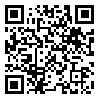Volume 10, Issue 1 (7-2022)
jmsthums 2022, 10(1): 48-63 |
Back to browse issues page
Download citation:
BibTeX | RIS | EndNote | Medlars | ProCite | Reference Manager | RefWorks
Send citation to:



BibTeX | RIS | EndNote | Medlars | ProCite | Reference Manager | RefWorks
Send citation to:
H T, M A A, M S, A T, R L, F K. Explaining the perception and experience of faculty members of Mashhad University of Medical Sciences of virtual education during the covid-19 epidemic. jmsthums 2022; 10 (1) :48-63
URL: http://jms.thums.ac.ir/article-1-1072-en.html
URL: http://jms.thums.ac.ir/article-1-1072-en.html
1- Mashhad University of Medical Sciences
2- Mashhad University of Medical Science
2- Mashhad University of Medical Science
Abstract: (2997 Views)
Background & Aim:Considering that recognizing the experiences of professors and students is important in improving the quality of Virtual educationthe present study aims to explain , the understanding and experience of faculty members of Mashhad University of Medical Sciences of virtual education during the covid-19 epidemic.
Methods: This qualitative study was conducted with a content analysis approach atMashhad University of Medical Sciences. B participants were selected from the faculty members of Mashhad University of Medical Sciences through purposive sampling. Semi-structured interviews were used to collect data. Sampling was continued until saturation of the data. Data analysis was performed using the content analysis method. The validity of the data was also confirmed according to Lincoln and Guba criteria.
Results: Data analysis led to the emergence of three main categories: 1. "advantages of Virtual education " With the sub-categories "Reducing economic costs, the flexibility of Virtual education and creating a suitable teaching-learning environment" and 2. "Disadvantages of Virtual education" With the subcategories "Lack of sufficient skills in using virtual training, Insufficient space, facilities and infrastructure, Lack of effective interaction and sufficient motivation, lack of ethics and information security, Impossibility of quality evaluation, Lack of proper software support, Impossibility of assessing proper attendance" and 3. "Virtual education promotion strategies" With the subcategories " Strategies to promote Virtual education in policy and incentive policies, Perform an effective evaluation, improving teaching skills, Combining online and offline training and infrastructure development and technical support"
Conclusion: Aid, management, and support of Virtual education structures, and promotion of cultural, motivational, and economic infrastructure, can help in the development of designing virtual education environments in universities and achieving educational goals at all levels of education
Methods: This qualitative study was conducted with a content analysis approach atMashhad University of Medical Sciences. B participants were selected from the faculty members of Mashhad University of Medical Sciences through purposive sampling. Semi-structured interviews were used to collect data. Sampling was continued until saturation of the data. Data analysis was performed using the content analysis method. The validity of the data was also confirmed according to Lincoln and Guba criteria.
Results: Data analysis led to the emergence of three main categories: 1. "advantages of Virtual education " With the sub-categories "Reducing economic costs, the flexibility of Virtual education and creating a suitable teaching-learning environment" and 2. "Disadvantages of Virtual education" With the subcategories "Lack of sufficient skills in using virtual training, Insufficient space, facilities and infrastructure, Lack of effective interaction and sufficient motivation, lack of ethics and information security, Impossibility of quality evaluation, Lack of proper software support, Impossibility of assessing proper attendance" and 3. "Virtual education promotion strategies" With the subcategories " Strategies to promote Virtual education in policy and incentive policies, Perform an effective evaluation, improving teaching skills, Combining online and offline training and infrastructure development and technical support"
Conclusion: Aid, management, and support of Virtual education structures, and promotion of cultural, motivational, and economic infrastructure, can help in the development of designing virtual education environments in universities and achieving educational goals at all levels of education
Type of Study: Research |
Subject:
Special
Received: 2022/05/18 | Accepted: 2022/08/2 | Published: 2022/08/3
Received: 2022/05/18 | Accepted: 2022/08/2 | Published: 2022/08/3
Send email to the article author
| Rights and permissions | |
 | This work is licensed under a Creative Commons Attribution-NonCommercial 4.0 International License. |






